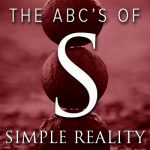
P-B is a system and must be treated and understood as a whole if we are to shift to a sustainable human community. To attempt piecemeal solutions of parts of a dysfunctional system is futile. That is why a paradigm shift is necessary. Since the underlying worldview of P-B, that is to say its beliefs, attitudes and value, are interconnected, interrelated and interdependent, they must be transcended and replaced with a sustainable worldview, namely P-A. The only way to do this is to give a profound response to the Three Great Questions that lead us to see both paradigms as systems. Where am I? Who Am I? Why Am I Here?
In P-B, I am in a fragmented paradigm where all form is disconnected and in a state of chaos. In P-A, the operative word is Oneness where form, both physical and mental is an illusion, and we live in a world of pure and indestructible energy governed by a system of intelligence and wisdom flowing from the Implicate Order, the field, which contains all that is or ever can be, without beginning or end.
“The great shock of twentieth-century science has been that systems cannot be understood by analysis. The properties of the parts are not intrinsic properties but can be understood only within the context of the larger whole. Thus the relationship between the parts and the whole has been reversed. In the systems approach the properties of the parts can be understood only from the organization of the whole. Accordingly, systems thinking concentrates not on basic building blocks [reductionism], but on the basic principles of organization. Systems thinking is “contextual,” which is the opposite of analytical thinking. Analysis means taking something apart in order to understand it; systems thinking means putting it into the context of a larger whole.”[i]
“Therefore, the shift from parts to the whole can also be seen as a shift from objects to Relationships. For the systems thinker the relationships are primary.”[ii] Once again, as Fritjof Capra has made clear, a worldview of Oneness wherein all of Creation is experienced as interconnected, interrelated and interdependent is the only viable narrative for a global village struggling on the edge of chaos.
[i] Capra, Fritjof, The Web of Life. New York: Doubleday, 1996, pp. 29-30.
[ii] Ibid., p. 37.


